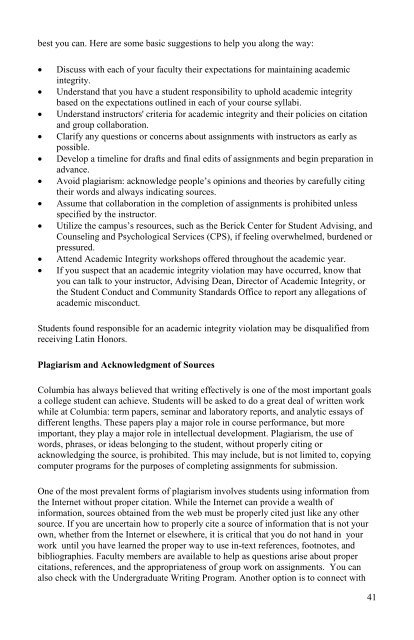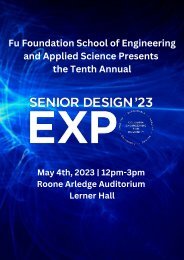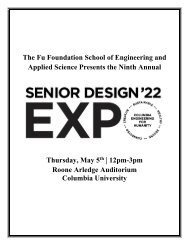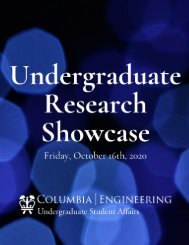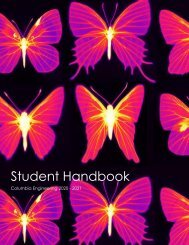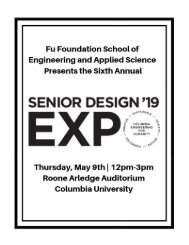SEAS Student Handbook
You also want an ePaper? Increase the reach of your titles
YUMPU automatically turns print PDFs into web optimized ePapers that Google loves.
est you can. Here are some basic suggestions to help you along the way:<br />
<br />
<br />
<br />
<br />
<br />
<br />
<br />
<br />
<br />
<br />
Discuss with each of your faculty their expectations for maintaining academic<br />
integrity.<br />
Understand that you have a student responsibility to uphold academic integrity<br />
based on the expectations outlined in each of your course syllabi.<br />
Understand instructors' criteria for academic integrity and their policies on citation<br />
and group collaboration.<br />
Clarify any questions or concerns about assignments with instructors as early as<br />
possible.<br />
Develop a timeline for drafts and final edits of assignments and begin preparation in<br />
advance.<br />
Avoid plagiarism: acknowledge people’s opinions and theories by carefully citing<br />
their words and always indicating sources.<br />
Assume that collaboration in the completion of assignments is prohibited unless<br />
specified by the instructor.<br />
Utilize the campus’s resources, such as the Berick Center for <strong>Student</strong> Advising, and<br />
Counseling and Psychological Services (CPS), if feeling overwhelmed, burdened or<br />
pressured.<br />
Attend Academic Integrity workshops offered throughout the academic year.<br />
If you suspect that an academic integrity violation may have occurred, know that<br />
you can talk to your instructor, Advising Dean, Director of Academic Integrity, or<br />
the <strong>Student</strong> Conduct and Community Standards Office to report any allegations of<br />
academic misconduct.<br />
<strong>Student</strong>s found responsible for an academic integrity violation may be disqualified from<br />
receiving Latin Honors.<br />
Plagiarism and Acknowledgment of Sources<br />
Columbia has always believed that writing effectively is one of the most important goals<br />
a college student can achieve. <strong>Student</strong>s will be asked to do a great deal of written work<br />
while at Columbia: term papers, seminar and laboratory reports, and analytic essays of<br />
different lengths. These papers play a major role in course performance, but more<br />
important, they play a major role in intellectual development. Plagiarism, the use of<br />
words, phrases, or ideas belonging to the student, without properly citing or<br />
acknowledging the source, is prohibited. This may include, but is not limited to, copying<br />
computer programs for the purposes of completing assignments for submission.<br />
One of the most prevalent forms of plagiarism involves students using information from<br />
the Internet without proper citation. While the Internet can provide a wealth of<br />
information, sources obtained from the web must be properly cited just like any other<br />
source. If you are uncertain how to properly cite a source of information that is not your<br />
own, whether from the Internet or elsewhere, it is critical that you do not hand in your<br />
work until you have learned the proper way to use in-text references, footnotes, and<br />
bibliographies. Faculty members are available to help as questions arise about proper<br />
citations, references, and the appropriateness of group work on assignments. You can<br />
also check with the Undergraduate Writing Program. Another option is to connect with<br />
41


